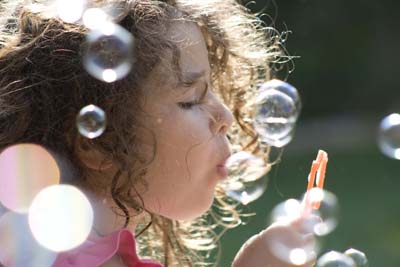How The Right Comments Will Help Boost Confidence And Self Esteem in Your Child
Posted on 07. Jun, 2007 by George in parenting
 Today’s parents have heard or read plenty about what to tell kids when they do or say something not quite nice, like criticizing the behavior rather than the child.
Today’s parents have heard or read plenty about what to tell kids when they do or say something not quite nice, like criticizing the behavior rather than the child.
For example, child experts advice saying “That was not a very nice thing to do”, instead of “You were a bad boy/girl.” Yet, even with the best intentions, parents sometimes make comments that weaken their children’s confidence.
Here are some common scenarios where you might have responded unfavorably toward a certain behavior.
Scenario 1: Your child sadly tells you that he failed to make the first-string soccer team.
The Wrong Words: “I know exactly how you feel.”
You want to be understanding and to let him or her know that such emotions are normal. But this response may make your child feel angrier because it suggests that the situation is somehow common. Plus, it may make your child stop talking about it and you will never learn what he or she finds so troubling about the situation.
The Right Words: Ask information-gathering questions, like “Tell me what happened?”
Listen as your child tells the story, so you know what matters to him or her. This will help him or her feel understood, than simply saying you understand.
Scenario 2: Your 5-year-old says, “I don’t like Ryan!”
The Wrong Words: “Yes, you do. Ryan is a very nice boy.”
Telling your child how he or she should feel is as harmful as telling him or her you know how he feels. You are suggesting that his or her natural reaction to people is not reliable and that he or she should feel something that shouldn’t be felt. By denying the validity of his or her feelings, you are holding back his or her ability to nurture relationships.
The Right Words: There is a reason why your child may dislike another. Again, ask questions like “What did Sam do to upset you?”, or “What would make things better?”
Allow your child to trust his or her feelings, to understand to express him or herself, and to explore solutions to repair the friendship.
Scenario 3: Your 7-year-old girl tells you about the Peter Pan production at school. She wants to be Tinkerbell.
The Wrong Words: “Sure you’ll get the part. You’re the best!”
Exceptional statements comparing a child with others can weigh heavily on a youngster. They may create expectations and impose standards that a child may fear he or she cannot live up to and may create self-doubt. On the other hand, encouraging realistic self-appraisal protects children and promotes optimism. Stop making exaggerated statements that measure your child against his or her peers.
The Right Words: Instead of “You’re the best,” say “You’d make a great Tinkerbell. It’ll be really nice if you get the part.”
Of course, you wouldn’t be reading this if you don’t already have a child who might have said these comments. If you’re said these words yourself, don’t scold yourself too much. Whoever said parenting was easy? Relax. Just make a mental note that your child will be better off if you avoid making such statements in the future.





chicago Rhinoplasty
23. Aug, 2011
i love this site and artucle inwish it ranked highher